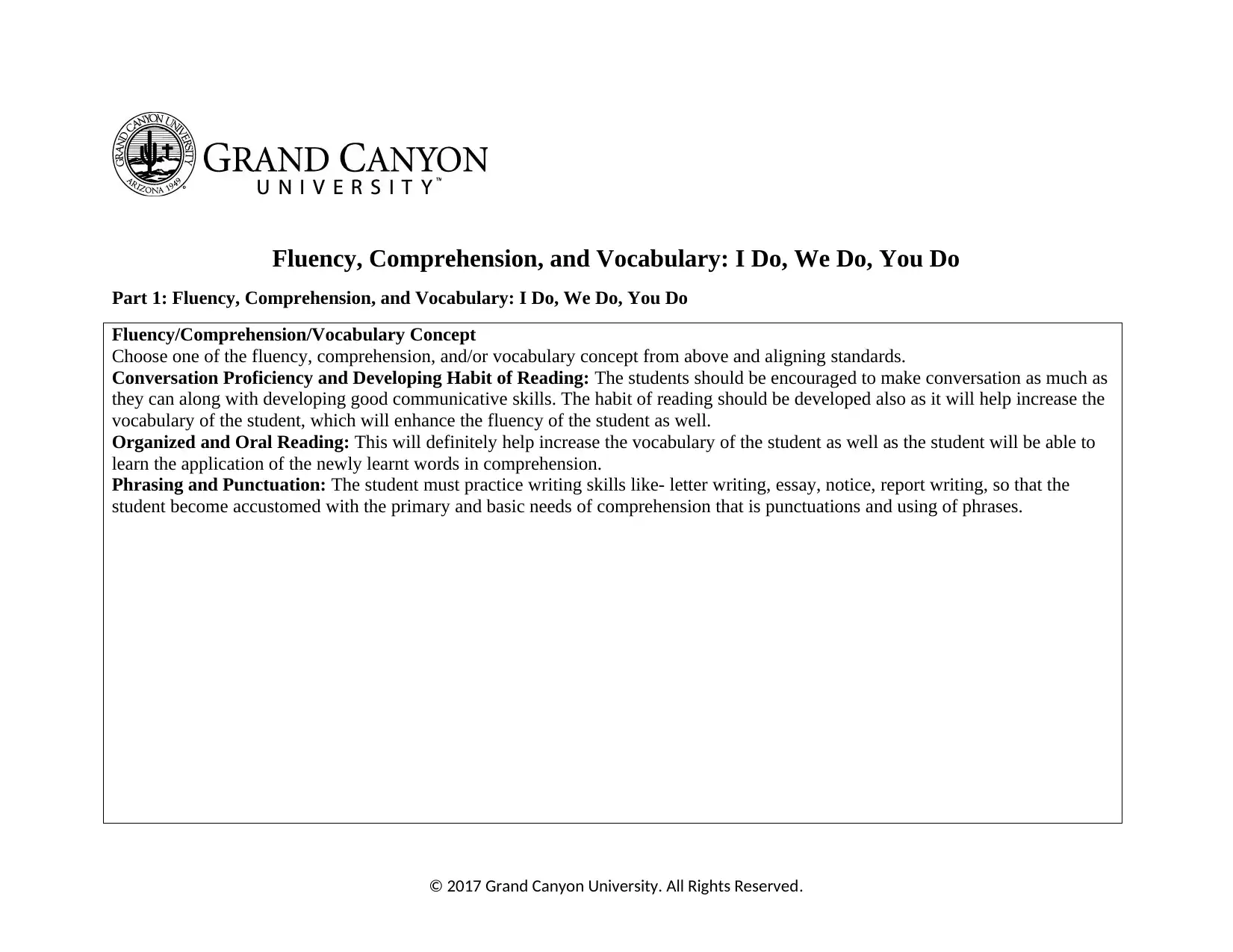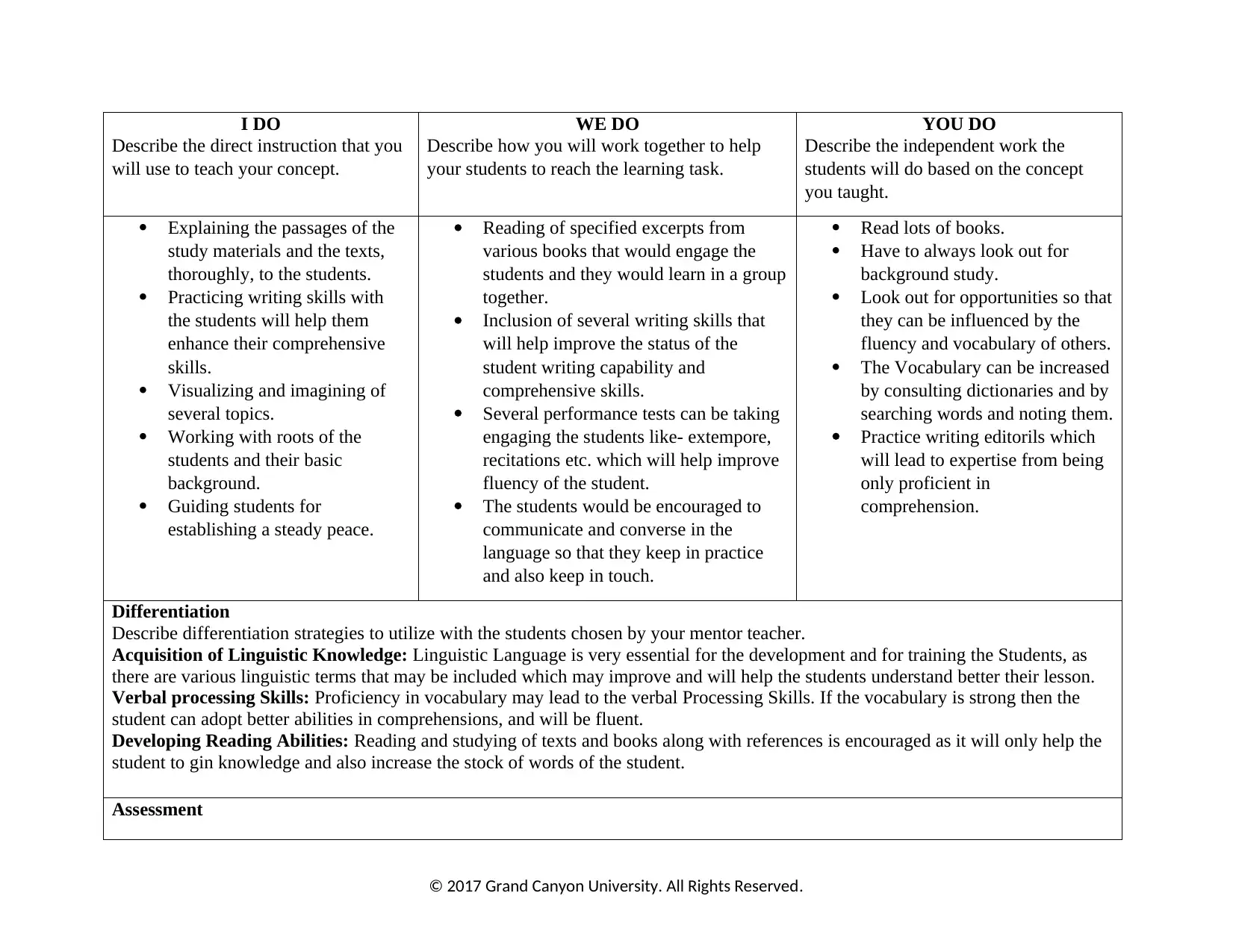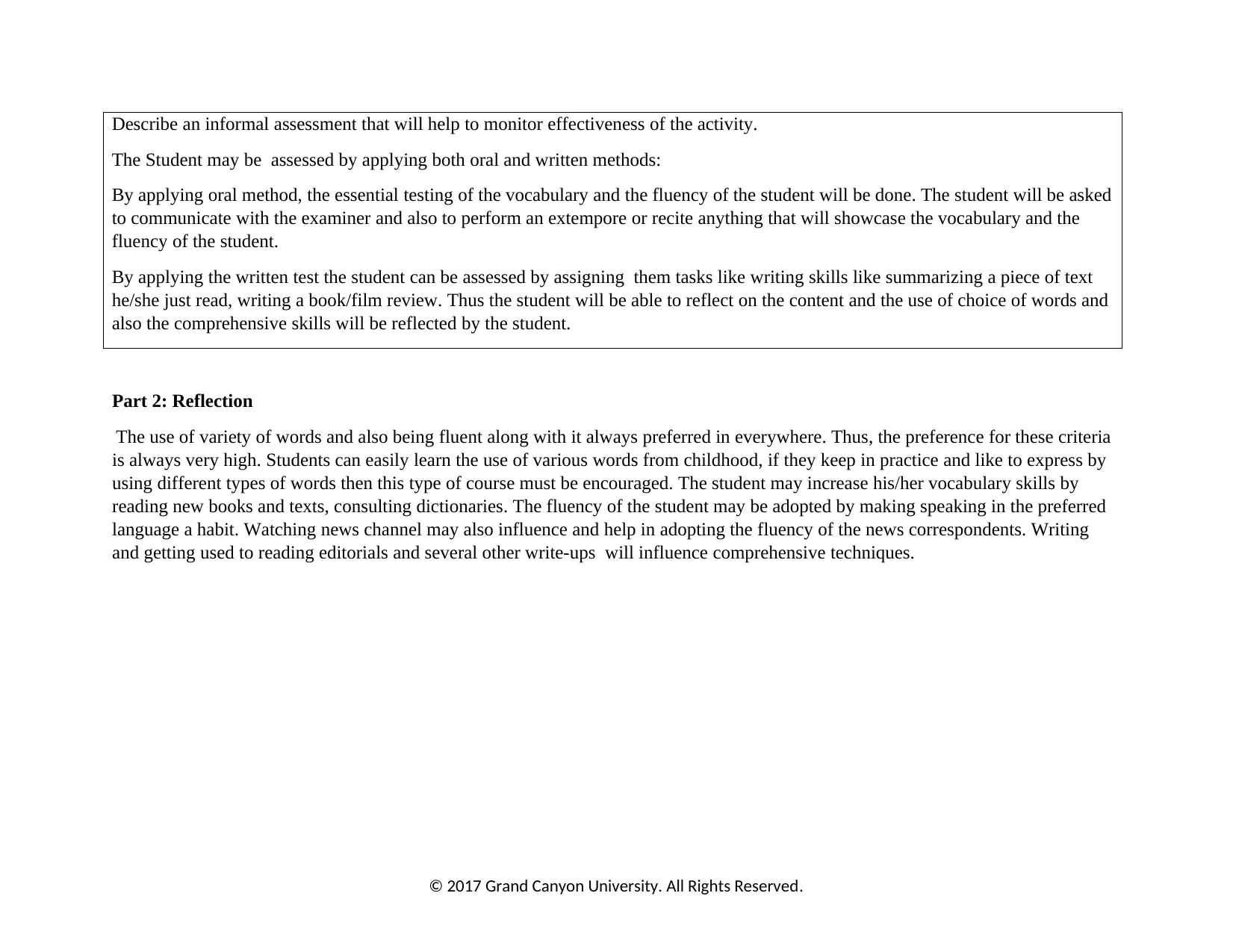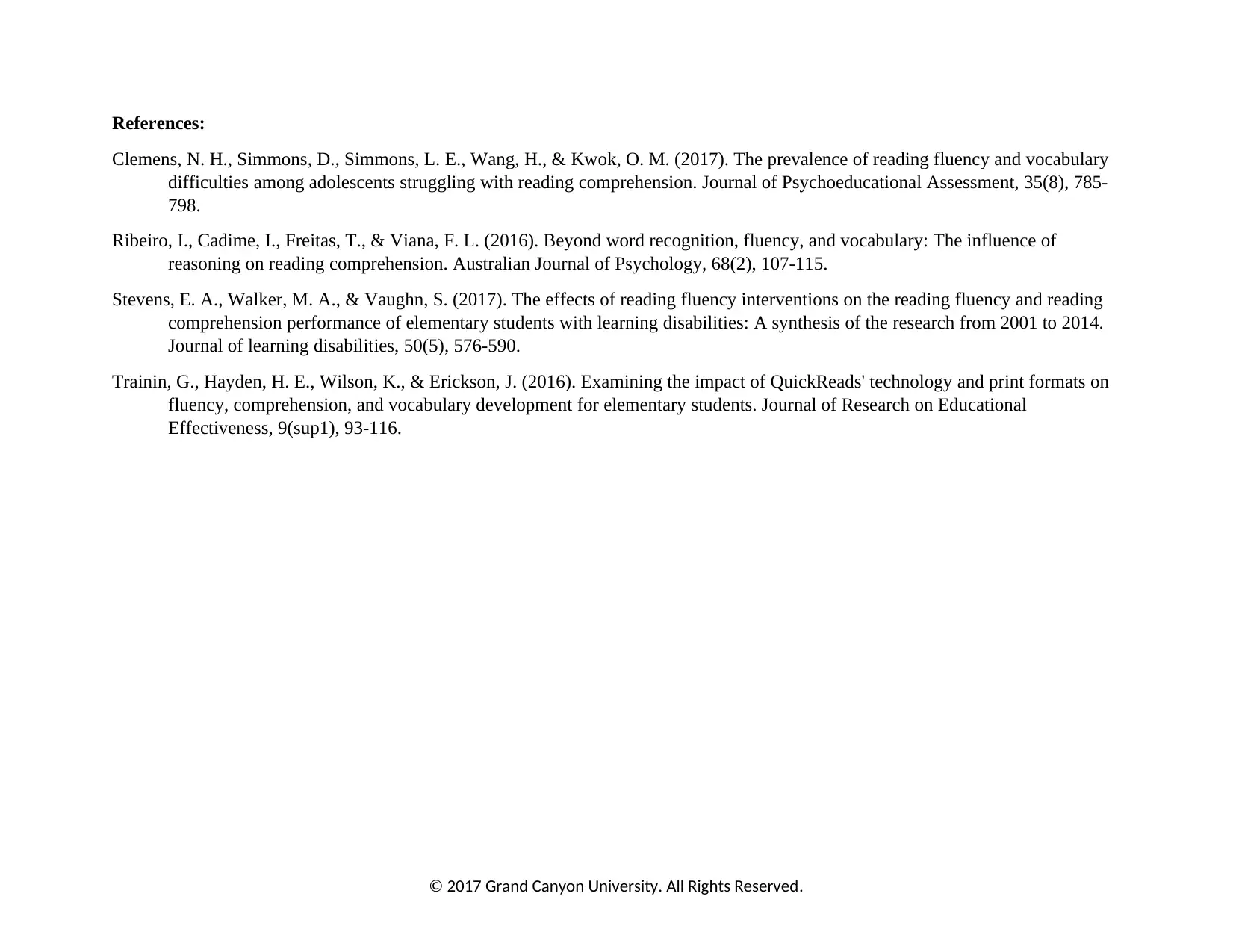Fluency, Comprehension, Vocabulary: I Do, We Do, You Do - GCU
VerifiedAdded on 2022/11/18
|4
|1091
|473
Homework Assignment
AI Summary
This assignment solution focuses on teaching fluency, comprehension, and vocabulary using the 'I Do, We Do, You Do' model. It outlines direct instruction methods, collaborative activities, and independent student work. The solution also addresses differentiation strategies to cater to diverse learners and suggests informal assessment techniques to monitor student progress. Furthermore, the assignment emphasizes the importance of linguistic knowledge, verbal processing skills, and reading abilities. The document includes practical approaches like encouraging conversation, developing reading habits, and practicing writing skills. Additionally, it suggests methods for vocabulary enhancement, such as using dictionaries and reading various texts. The reflection part highlights the significance of fluency and vocabulary in communication and comprehensive skills, encouraging students to adopt these skills through consistent practice and exposure to different sources.

Fluency, Comprehension, and Vocabulary: I Do, We Do, You Do
Part 1: Fluency, Comprehension, and Vocabulary: I Do, We Do, You Do
Fluency/Comprehension/Vocabulary Concept
Choose one of the fluency, comprehension, and/or vocabulary concept from above and aligning standards.
Conversation Proficiency and Developing Habit of Reading: The students should be encouraged to make conversation as much as
they can along with developing good communicative skills. The habit of reading should be developed also as it will help increase the
vocabulary of the student, which will enhance the fluency of the student as well.
Organized and Oral Reading: This will definitely help increase the vocabulary of the student as well as the student will be able to
learn the application of the newly learnt words in comprehension.
Phrasing and Punctuation: The student must practice writing skills like- letter writing, essay, notice, report writing, so that the
student become accustomed with the primary and basic needs of comprehension that is punctuations and using of phrases.
© 2017 Grand Canyon University. All Rights Reserved.
Part 1: Fluency, Comprehension, and Vocabulary: I Do, We Do, You Do
Fluency/Comprehension/Vocabulary Concept
Choose one of the fluency, comprehension, and/or vocabulary concept from above and aligning standards.
Conversation Proficiency and Developing Habit of Reading: The students should be encouraged to make conversation as much as
they can along with developing good communicative skills. The habit of reading should be developed also as it will help increase the
vocabulary of the student, which will enhance the fluency of the student as well.
Organized and Oral Reading: This will definitely help increase the vocabulary of the student as well as the student will be able to
learn the application of the newly learnt words in comprehension.
Phrasing and Punctuation: The student must practice writing skills like- letter writing, essay, notice, report writing, so that the
student become accustomed with the primary and basic needs of comprehension that is punctuations and using of phrases.
© 2017 Grand Canyon University. All Rights Reserved.
Paraphrase This Document
Need a fresh take? Get an instant paraphrase of this document with our AI Paraphraser

I DO
Describe the direct instruction that you
will use to teach your concept.
WE DO
Describe how you will work together to help
your students to reach the learning task.
YOU DO
Describe the independent work the
students will do based on the concept
you taught.
Explaining the passages of the
study materials and the texts,
thoroughly, to the students.
Practicing writing skills with
the students will help them
enhance their comprehensive
skills.
Visualizing and imagining of
several topics.
Working with roots of the
students and their basic
background.
Guiding students for
establishing a steady peace.
Reading of specified excerpts from
various books that would engage the
students and they would learn in a group
together.
Inclusion of several writing skills that
will help improve the status of the
student writing capability and
comprehensive skills.
Several performance tests can be taking
engaging the students like- extempore,
recitations etc. which will help improve
fluency of the student.
The students would be encouraged to
communicate and converse in the
language so that they keep in practice
and also keep in touch.
Read lots of books.
Have to always look out for
background study.
Look out for opportunities so that
they can be influenced by the
fluency and vocabulary of others.
The Vocabulary can be increased
by consulting dictionaries and by
searching words and noting them.
Practice writing editorils which
will lead to expertise from being
only proficient in
comprehension.
Differentiation
Describe differentiation strategies to utilize with the students chosen by your mentor teacher.
Acquisition of Linguistic Knowledge: Linguistic Language is very essential for the development and for training the Students, as
there are various linguistic terms that may be included which may improve and will help the students understand better their lesson.
Verbal processing Skills: Proficiency in vocabulary may lead to the verbal Processing Skills. If the vocabulary is strong then the
student can adopt better abilities in comprehensions, and will be fluent.
Developing Reading Abilities: Reading and studying of texts and books along with references is encouraged as it will only help the
student to gin knowledge and also increase the stock of words of the student.
Assessment
© 2017 Grand Canyon University. All Rights Reserved.
Describe the direct instruction that you
will use to teach your concept.
WE DO
Describe how you will work together to help
your students to reach the learning task.
YOU DO
Describe the independent work the
students will do based on the concept
you taught.
Explaining the passages of the
study materials and the texts,
thoroughly, to the students.
Practicing writing skills with
the students will help them
enhance their comprehensive
skills.
Visualizing and imagining of
several topics.
Working with roots of the
students and their basic
background.
Guiding students for
establishing a steady peace.
Reading of specified excerpts from
various books that would engage the
students and they would learn in a group
together.
Inclusion of several writing skills that
will help improve the status of the
student writing capability and
comprehensive skills.
Several performance tests can be taking
engaging the students like- extempore,
recitations etc. which will help improve
fluency of the student.
The students would be encouraged to
communicate and converse in the
language so that they keep in practice
and also keep in touch.
Read lots of books.
Have to always look out for
background study.
Look out for opportunities so that
they can be influenced by the
fluency and vocabulary of others.
The Vocabulary can be increased
by consulting dictionaries and by
searching words and noting them.
Practice writing editorils which
will lead to expertise from being
only proficient in
comprehension.
Differentiation
Describe differentiation strategies to utilize with the students chosen by your mentor teacher.
Acquisition of Linguistic Knowledge: Linguistic Language is very essential for the development and for training the Students, as
there are various linguistic terms that may be included which may improve and will help the students understand better their lesson.
Verbal processing Skills: Proficiency in vocabulary may lead to the verbal Processing Skills. If the vocabulary is strong then the
student can adopt better abilities in comprehensions, and will be fluent.
Developing Reading Abilities: Reading and studying of texts and books along with references is encouraged as it will only help the
student to gin knowledge and also increase the stock of words of the student.
Assessment
© 2017 Grand Canyon University. All Rights Reserved.

Describe an informal assessment that will help to monitor effectiveness of the activity.
The Student may be assessed by applying both oral and written methods:
By applying oral method, the essential testing of the vocabulary and the fluency of the student will be done. The student will be asked
to communicate with the examiner and also to perform an extempore or recite anything that will showcase the vocabulary and the
fluency of the student.
By applying the written test the student can be assessed by assigning them tasks like writing skills like summarizing a piece of text
he/she just read, writing a book/film review. Thus the student will be able to reflect on the content and the use of choice of words and
also the comprehensive skills will be reflected by the student.
Part 2: Reflection
The use of variety of words and also being fluent along with it always preferred in everywhere. Thus, the preference for these criteria
is always very high. Students can easily learn the use of various words from childhood, if they keep in practice and like to express by
using different types of words then this type of course must be encouraged. The student may increase his/her vocabulary skills by
reading new books and texts, consulting dictionaries. The fluency of the student may be adopted by making speaking in the preferred
language a habit. Watching news channel may also influence and help in adopting the fluency of the news correspondents. Writing
and getting used to reading editorials and several other write-ups will influence comprehensive techniques.
© 2017 Grand Canyon University. All Rights Reserved.
The Student may be assessed by applying both oral and written methods:
By applying oral method, the essential testing of the vocabulary and the fluency of the student will be done. The student will be asked
to communicate with the examiner and also to perform an extempore or recite anything that will showcase the vocabulary and the
fluency of the student.
By applying the written test the student can be assessed by assigning them tasks like writing skills like summarizing a piece of text
he/she just read, writing a book/film review. Thus the student will be able to reflect on the content and the use of choice of words and
also the comprehensive skills will be reflected by the student.
Part 2: Reflection
The use of variety of words and also being fluent along with it always preferred in everywhere. Thus, the preference for these criteria
is always very high. Students can easily learn the use of various words from childhood, if they keep in practice and like to express by
using different types of words then this type of course must be encouraged. The student may increase his/her vocabulary skills by
reading new books and texts, consulting dictionaries. The fluency of the student may be adopted by making speaking in the preferred
language a habit. Watching news channel may also influence and help in adopting the fluency of the news correspondents. Writing
and getting used to reading editorials and several other write-ups will influence comprehensive techniques.
© 2017 Grand Canyon University. All Rights Reserved.
⊘ This is a preview!⊘
Do you want full access?
Subscribe today to unlock all pages.

Trusted by 1+ million students worldwide

References:
Clemens, N. H., Simmons, D., Simmons, L. E., Wang, H., & Kwok, O. M. (2017). The prevalence of reading fluency and vocabulary
difficulties among adolescents struggling with reading comprehension. Journal of Psychoeducational Assessment, 35(8), 785-
798.
Ribeiro, I., Cadime, I., Freitas, T., & Viana, F. L. (2016). Beyond word recognition, fluency, and vocabulary: The influence of
reasoning on reading comprehension. Australian Journal of Psychology, 68(2), 107-115.
Stevens, E. A., Walker, M. A., & Vaughn, S. (2017). The effects of reading fluency interventions on the reading fluency and reading
comprehension performance of elementary students with learning disabilities: A synthesis of the research from 2001 to 2014.
Journal of learning disabilities, 50(5), 576-590.
Trainin, G., Hayden, H. E., Wilson, K., & Erickson, J. (2016). Examining the impact of QuickReads' technology and print formats on
fluency, comprehension, and vocabulary development for elementary students. Journal of Research on Educational
Effectiveness, 9(sup1), 93-116.
© 2017 Grand Canyon University. All Rights Reserved.
Clemens, N. H., Simmons, D., Simmons, L. E., Wang, H., & Kwok, O. M. (2017). The prevalence of reading fluency and vocabulary
difficulties among adolescents struggling with reading comprehension. Journal of Psychoeducational Assessment, 35(8), 785-
798.
Ribeiro, I., Cadime, I., Freitas, T., & Viana, F. L. (2016). Beyond word recognition, fluency, and vocabulary: The influence of
reasoning on reading comprehension. Australian Journal of Psychology, 68(2), 107-115.
Stevens, E. A., Walker, M. A., & Vaughn, S. (2017). The effects of reading fluency interventions on the reading fluency and reading
comprehension performance of elementary students with learning disabilities: A synthesis of the research from 2001 to 2014.
Journal of learning disabilities, 50(5), 576-590.
Trainin, G., Hayden, H. E., Wilson, K., & Erickson, J. (2016). Examining the impact of QuickReads' technology and print formats on
fluency, comprehension, and vocabulary development for elementary students. Journal of Research on Educational
Effectiveness, 9(sup1), 93-116.
© 2017 Grand Canyon University. All Rights Reserved.
1 out of 4
Related Documents
Your All-in-One AI-Powered Toolkit for Academic Success.
+13062052269
info@desklib.com
Available 24*7 on WhatsApp / Email
![[object Object]](/_next/static/media/star-bottom.7253800d.svg)
Unlock your academic potential
Copyright © 2020–2026 A2Z Services. All Rights Reserved. Developed and managed by ZUCOL.





